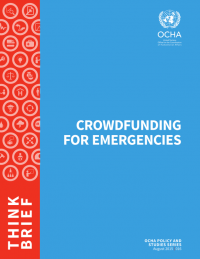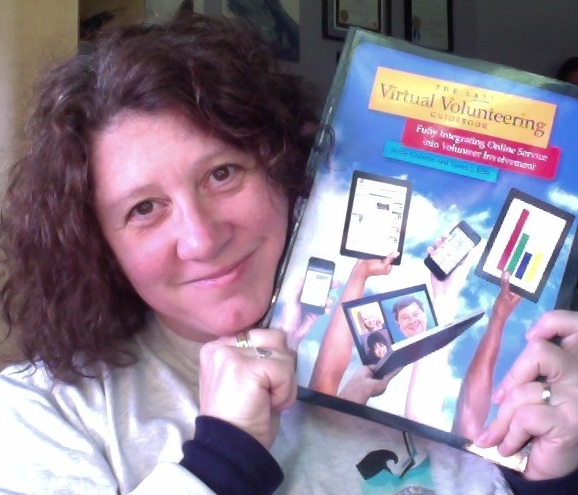 It’s the FIVE-YEAR anniversary of the publication of my book with Susan Ellis, The Last Virtual Volunteering Guidebook! The book is the result of more than 20 years of research and experience regarding virtual volunteering, including online micro volunteering, crowd sourcing, digital volunteering, online mentoring and all the various manifestations of online service. It’s packed with examples from a variety of organizations – it’s not just our ideas about how virtual volunteering might work but how it does work, and how challenges are overcome, at many different nonprofits, NGOs and school-based programs.
It’s the FIVE-YEAR anniversary of the publication of my book with Susan Ellis, The Last Virtual Volunteering Guidebook! The book is the result of more than 20 years of research and experience regarding virtual volunteering, including online micro volunteering, crowd sourcing, digital volunteering, online mentoring and all the various manifestations of online service. It’s packed with examples from a variety of organizations – it’s not just our ideas about how virtual volunteering might work but how it does work, and how challenges are overcome, at many different nonprofits, NGOs and school-based programs.
Susan and I wrote The Last Virtual Volunteering Guidebook in such a way that it would be timeless – as timeless as a book about using computers, laptops, smart phones and other networked devices could be. That’s not easy when it comes to technology, but we gave it a try – and upon re-reading my own book, I was shocked at how successful we were!
The Last Virtual Volunteering Guidebook is for
- both practitioners – people involving volunteers – and academics that do research regarding volunteering.
- both people brand new to recruiting and supporting volunteers and those that are veteran managers of volunteers
- both people brand new to virtual volunteering and experienced managers who are looking for confirmation they are on the right track or information to help them make the case to expand their programs.
It is USA-centric but it offers a lot of international perspectives as well.
The book includes:
- Detailed advice on virtual volunteering assignment, including one-time “Byte-Sized” tasks (micro-volunteering / microtasks), longer-term, higher-responsibility roles and virtual team assignments.
- A thorough look at various practices for screening and matching volunteers to assignments, with an eye to getting the most capable volunteers into your volunteering ranks and preventing incomplete assignments or burdensome management tasks
- How to make online volunteer roles accessible and welcoming for a variety, diversity of people
- More details about how to work successfully with online volunteers, so that they are successful, your organization benefits and volunteer managers aren’t overwhelmed
- Ensuring safety – and balancing safety with program goals
- Respecting privacy of both the organization and online volunteers themselves
- Online mentoring, including adults mentoring children/students
- Blogging by, for and about volunteers
- Online activism
- Spontaneous online volunteers
- Live online events with volunteers
- The future of virtual volunteering and how to start planning for oncoming trends
There’s also a chapter just for online volunteers themselves, which organizations can also use in creating their own materials for online volunteers.
In conjunction with the guidebook, I have maintained the Virtual Volunteering Wiki, a free online resource and collaborative space for sharing resources regarding virtual volunteering.
Here’s why we called it the LAST guidebook and reviews of The Last Virtual Volunteering Guidebook.
The Last Virtual Volunteering Guidebook is available for purchase in paperback or as an ebook (PDF) by Energize, Inc.
If you read the book, I would so appreciate it if you could write and post a review of it on the Amazon, Barnes and Noble and Good Reads web sites (you can write the same review on all three sites).
Here’s some of my free advice on volunteer engagement, not just virtual volunteering:
- Diagnosing the causes of volunteer recruitment problems
- Brilliant volunteer firefighter recruitment video from Germany
- An incredible volunteer recruitment success story in Texas
- What should be on your organization’s web site
- Required Volunteer Information on Your Web Site
- Mission statements for your volunteer engagement
- Recruiting Local Volunteers To Increase Diversity Among the Ranks
- Welcoming immigrants as volunteers at your organization
- If humans can do it, so can volunteers (who are, BTW, also humans)
- Letting Fear Prevent Volunteer Involvement is Too Risky
- If I can’t find what I’m looking for on your web site, who else can’t?
- why you can’t find/keep volunteer firefighters
- Making certain volunteers feel unwelcomed because of your language
I also frequently blog about virtual volunteering. Examples:







